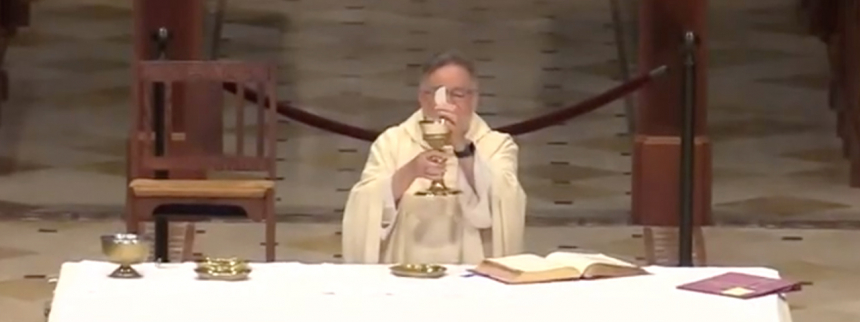
On Saturday, June 13, Bishop Jaime Soto celebrated the Vigil Mass for the Solemnity of the Body and Blood of Christ, also known as Corpus Christi. His homily from the Cathedral of the Blessed Sacrament follows:
Jesus used clear, concrete – almost graphic – language in the gospel passage this evening to teach about the mystery of the Eucharist. “Unless you eat the flesh of the Son of Man and drink his blood, you do not have life within you.” (Jn. 6.53) These words of Jesus do not repel us; they convince us to come to the Table of the Lord.
The words of Moses in the first reading remind us of the long, yearning desire to be here around this table, this altar of sacrifice. “He (the Lord) therefore let you be afflicted with hunger, and then fed you with manna,” (Deut. 8.3) Moses told the chosen people wandering in the desert. We have been afflicted with a holy hunger for the bread from heaven, the Bread of Life, our Lord Jesus. We say a strong yes to the rhetorical question of St. Paul in the second reading, “The bread that we break, is it not a participation in the body of Christ?” (1 Cor. 10.16)
As we eagerly and gratefully gather for the beautiful feast of Corpus Christi, consider carefully the life Jesus offers us: “Whoever eats my flesh and drinks my blood remains in me and I in him.” (Jn. 6.56) The Lord Jesus intentionally unites the bread and wine offered at the Last Supper with his bloody sacrifice on the Cross. The bread and wine at the table of the Last Supper are the body and blood offered on the cross. The sacrifice of the Mass is a sacramental participation in these two events because in the mind and the heart of Jesus, they are one. He offered himself on the cross, and on the night before he died, he intentionally and mercifully wanted his disciples to be part of that offering. This was so that “Just as the living Father sent me and I have life because of the Father, so also the one who feeds on me will have life because of me.” (Jn. 6.57)
Understand what Jesus did then so that we might understand what he does now. The life Jesus had received from the Father was a life of loving sacrifice. Jesus loved his heavenly Father and obediently gave his life so that the Father could be reconciled to the world. “God so loved the world that he gave his only Son.” (Jn. 3.16) We heard these words in last Sunday’s gospel. This was the nature of Jesus’ life with the Father. To share in the life of Jesus through the Eucharist is to share in this life of sacrificial love for the world. We are saved by this love. We are also being conformed to this love. We are being conformed by this love into the one body of Christ.
Being transformed into the one body of Christ by the one bread of Christ challenges us as we struggle with the social and racial unrest of these times. The feast of Corpus Christi and our return to the table of the Lord during this troubling moment is not a coincidental accident. It is a providential prompting of the Holy Spirit. St. Paul told us clearly in the second reading, “Because the loaf of bread is one, we, though many, are one body, for we all partake of the one loaf.” (1 Cor. 10.17) We partake of the one bread of life, the Body and Blood of our Lord Jesus who sacrificed himself so that we might be reconciled to God and one another.
By receiving from the Lord the Holy Communion, the Bread of Life, we are also sharing in the sacrifice that brings us into a divine communion with the Father and one another through the blood of Christ. We eagerly open our hands to receive the precious body of Christ. Are we as eager to share in the sacrifice to become the one body of Christ, because this is the life to which he invites us? “The one who feeds on me will have life because of me.” (Jn. 6.57) We have life because of him. We have the life given by him, a life of sacrifice so that all might be reconciled to one another and to the Father.
What are those sacrifices we must make so that we may more worthily partake of the one Bread of Life? We each must make an examination of conscience to turn away prejudices and resentment. We should examine our habits of thoughts and our habits of behavior towards one another.
Racism is a blindness that perpetuates division. It is plague that perpetuates moral-distancing. St. Paul told the Ephesians, “For he is our peace, he who made both one and broke down the dividing wall of enmity, through his flesh.” (Eph. 2.14) For the disciple of Jesus, reconciliation is not just good policy or good politics. Reconciliation is personal, “for he is our peace.” Jesus sacrificed himself to break down the dividing wall through his flesh. “Whoever eats my flesh and drinks my blood remains in me and I in him.” (Jn. 6.56) To remain in Christ we must also work to remain with one another so that we can be one body in Christ, the one body of Christ.

